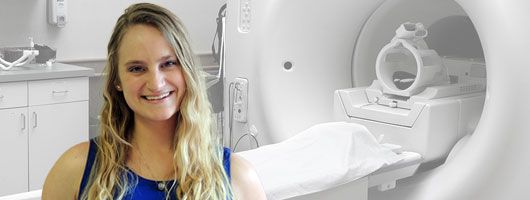 Pictured | Leah Hudkins | Medical Imaging Technology | Elkhart, Indiana (hometown)
Pictured | Leah Hudkins | Medical Imaging Technology | Elkhart, Indiana (hometown)
About the Bachelor of Science in Medical Imaging Technology
The Bachelor of Science in Medical Imaging Technology (BSMIT) program is designed to provide students seeking additional education beyond the Associate Degree in Radiography and offers course work and clinical field experience in Computed Tomography (CT), Magnetic Resonance Imaging (MRI), Cardiovascular Imaging (CV) and Ultrasound. Diagnostic radiography is generally considered the gateway to a career in the medical imaging profession. Students seeking to gain experience and expertise in an advanced imaging modality may do so through formal education and clinical field experience such as that provided by the BSMIT program. The program consists of modality-specific coursework designed to complement clinical field experience course work that is completed at affiliated clinical agencies in the region.
Upon successful completion of the program graduates earn a BS degree in Medical Imaging Technology and are prepared as competent, knowledgeable professionals prepared to take the national credentialing exam in their elected imaging modality (CT, CV, MRI or Ultrasound). The program is designed to prepare students in all imaging modalities to sit for the national credentialing exam sponsored by the American Registry of Radiologic Technologists (ARRT) or the Association of Diagnostic Medical Sonographers (ARDMS) for ultrasound. Additional information about the ARDMS can be found at www.ardms.org
The BSMIT program consists of formal course work, much of which is taught online, and 24-34 hours of clinical experience each week and can be completed in two semesters (fall and spring) for those students who wish to pursue CT, MRI or Cardiovascular Imaging and four semesters for ultrasound. If classes meet, it is one day per week. This allows the student a degree of flexibility in scheduling clinical practicum/clinical experience course work.
Academic Advising
College policy on advising requires that students meet with their academic advisors at least once each year, and in some departments, prior to each semester’s to enrollment. Advising holds are placed on all Vera Z. Dwyer College of Health Science medical imaging students prior to advance registration and are released following advising appointments. Students with a declared major are advised in their academic units. To determine who your advisor is and how to contact them, see One.IU.
General Education Curriculum
Courses from accredited schools can be transferred and applied to the BSMIT. Submission of an official credit transfer report (CTR) is required for all work transferred from another accredited school. To obtain an official CTR, the student must request an official transcript from all institutions, except IU systemwide campuses and be forwarded to the IU South Bend Office of Admissions for evaluation. Each student record is individually evaluated for applicability of courses towards the general-education requirements. Students must also submit official transcripts to the IU South Bend Radiography/Medical Imaging Department to fulfill BSMIT Clinical Program application requirements.
Students who received radiography degrees from a program accredited by the Joint Review Committee on Education in Radiologic Technology (JRCERT) will be considered transfer students for the purpose of fulfilling the campuswide general-education requirements at IU South Bend. All courses certified as meeting the campuswide general-education requirements are designated in the Schedule of Classes.
Degree Requirements (120 cr.)
Degree Map >>
Students receiving the Bachelor of Science in Medical Imaging Technology must be a graduate of an accredited an Associate of Science in Radiography degree program and complete the following for a total of 120 credit hours (depending on modality):
- IU South Bend Dwyer College of Health Sciences Campuswide General Education Curriculum (9 cr.)
- Computer Literacy (3 cr.)
- Diversity in United States Society | select from approved 390 level course list (3 cr.)
- Common Core | select from approved 390 or 399 course list (3 cr.)
- Associate of Science Completion (81 cr.)
- Clinical Professional Course Requirements (30 cr.)
- A minimum of 30 credit hours at the 300- or 400-level.
- Courses required for the major must be completed with a grade of C or higher.
- A minimum CGPA of 2.5 is required.
Clinical Professional Course Requirements (30 cr.)
All courses are 3 credits unless otherwise noted.
Didactic Courses
- AHLT-R 404 Sectional Imaging Anatomy
- AHLT-R 405 Advanced Diagnostic Imaging I
for CT/MRI/Cardiovascular - AHLT-R 406 Advanced Diagnostic Imaging II
- AHLT-R 407 Seminar
- AHLT-R 408 Topics in Radiologic Sciences
- AHLT-R 409 Project in Medical Imaging
- AHLT-R 434 Ultrasound Physics 1
Ultrasound concentration only take in place of AHLT-R 405
Select one of the following:
- AHLT-R 482 Clinical Practicum: Computed Tomography (CT) (12 cr.)
- AHLT-R 483 Clinical Practicum: Magnetic Resonance Imaging (12 cr.)
- AHLT-R 484 Clinical Practicum: Ultrasound (12 cr.)
Photo credit | Patrik Neckman via Flickr | cc